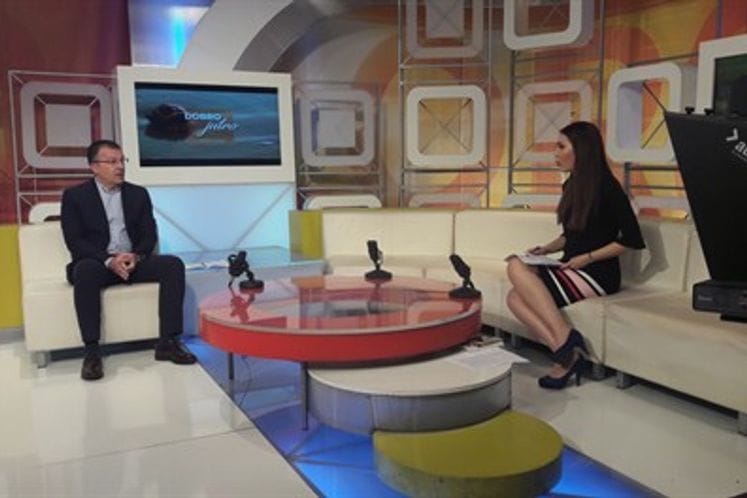- Government of Montenegro
Director-General Goran Šćepanović at TVCG: Domesti...
Director-General Goran Šćepanović at TVCG: Domestic products have quality and capacity for placement on foreign market

Podgorica,
Montenegro (20 February 2018) -- Montenegro has high quality agricultural
products for placement on the foreign market, but apart from quality, what is
needed is marketing and connecting with big chains, Director-General for
Multilateral and Regional Trade Cooperation and Economic Foreign Relations of
the Ministry of Economy Goran Šćepanović
highlighted while making guest appearance on National Broadcaster TVCG.
He talked about the current negotiations between Montenegro and Turkey on amendments to the Agreement on Free Trade and Additional Liberalisation of the Market for Agricultural Products.
“As far as quality and compliance with EU standards are concerned, our products meet all the criteria. We are witnessing an increasing number of domestic agricultural products in our stores and these products, which we all recognise, are, among other things, the subject of negotiations on further liberalisation with Turkey,” Director-General Šćepanović said, adding that it is very difficult to participate individually on foreign markets, bearing in mind that Montenegrin producers do not have enough quantities to play in big markets.
 Nevertheless, as he added, the product that we are best
known for, not only in the region but also in the wider area, is Plantaže wine,
produced in large quantities and present in almost all markets. According to
him, the aim is to plunder the products we have in sufficient surplus on the
foreign market.
Nevertheless, as he added, the product that we are best
known for, not only in the region but also in the wider area, is Plantaže wine,
produced in large quantities and present in almost all markets. According to
him, the aim is to plunder the products we have in sufficient surplus on the
foreign market.
“We have quality, we have capacity, we need an additional market. Of course, most of the commodities of Montenegro are flourishing with the countries with which we have signed a free trade agreement – CEFTA and EU countries, so that the trade with Turkey does not represent a large percentage, but we consider it to be huge capacity, not only because of export opportunities, but also in attracting foreign investments,” Director-General Šćepanović said.
He said
that Montenegro, as well as Turkey, has a defined list of goods for which it is
interested to further liberalise the market.
“The basic idea is to exchange information when negotiating, so as not to disturb its own market. What we insist on to further liberalise is to reduce the customs rate and other restrictions when importing Montenegrin products into their market. Of course, they insist on same, too. We have a list of products and as long as the negotiations go on, we can not come up with concrete data for possible deviations, but I can say that, if we were talking in percent, we have agreed about 89% of the offered. There remain 10%-20% of the goods from the list that are our biggest interest, while at the same time are sensitive products for the Turkish side, and in the continuation of the negotiations, we will try to reach a mutually acceptable solution,” Director-General Šćepanović noted.
He recalled that Turkey has concluded a Customs Union Agreement with the EU, which means that the rules of origin and product safety are the same or fairly similar.
“Regarding agricultural products, these are rules that apply to food safety, phyto-sanitary, sanitary, veterinary certificates and in that sense Montenegro meets all the requirements. This was the subject of the first preparatory session, where we presented our capacities, i.e. our degree of harmonisation of the regulations with the EU in terms that we have been enabled in this way to meet the criteria for placing products on the Turkish market,” he added.
Speaking of potential investments, Šćepanović said that the signing of the Free Trade Agreement created a framework and a precondition for achieving better cooperation, as all agreements guarantee certain security of investments.
“A think that one of the best signals we send, in terms of security and safety, is our NATO membership and the harmonisation of our legislation with the EU legislation, with which most investors are already familiar. By agreements, we made a precondition for this interest, which exists, to be concreted with investments,” Šćepanović said.
He recalled that the existing Free Trade Agreement between Montenegro and the Republic of Turkey was signed in 2008, and its implementation started on 1 January 2010.
